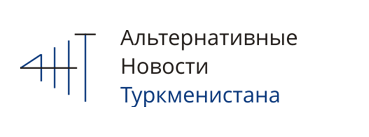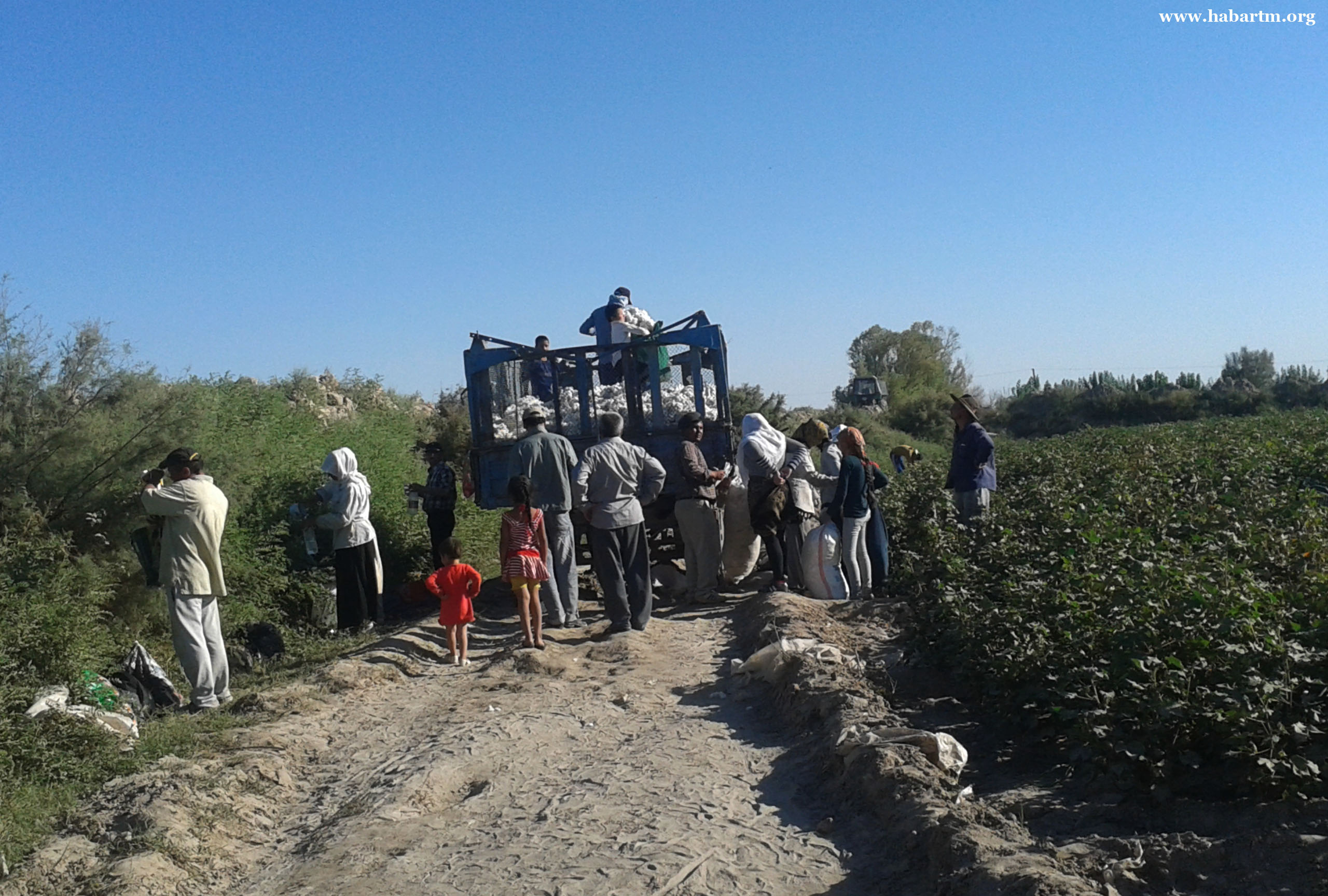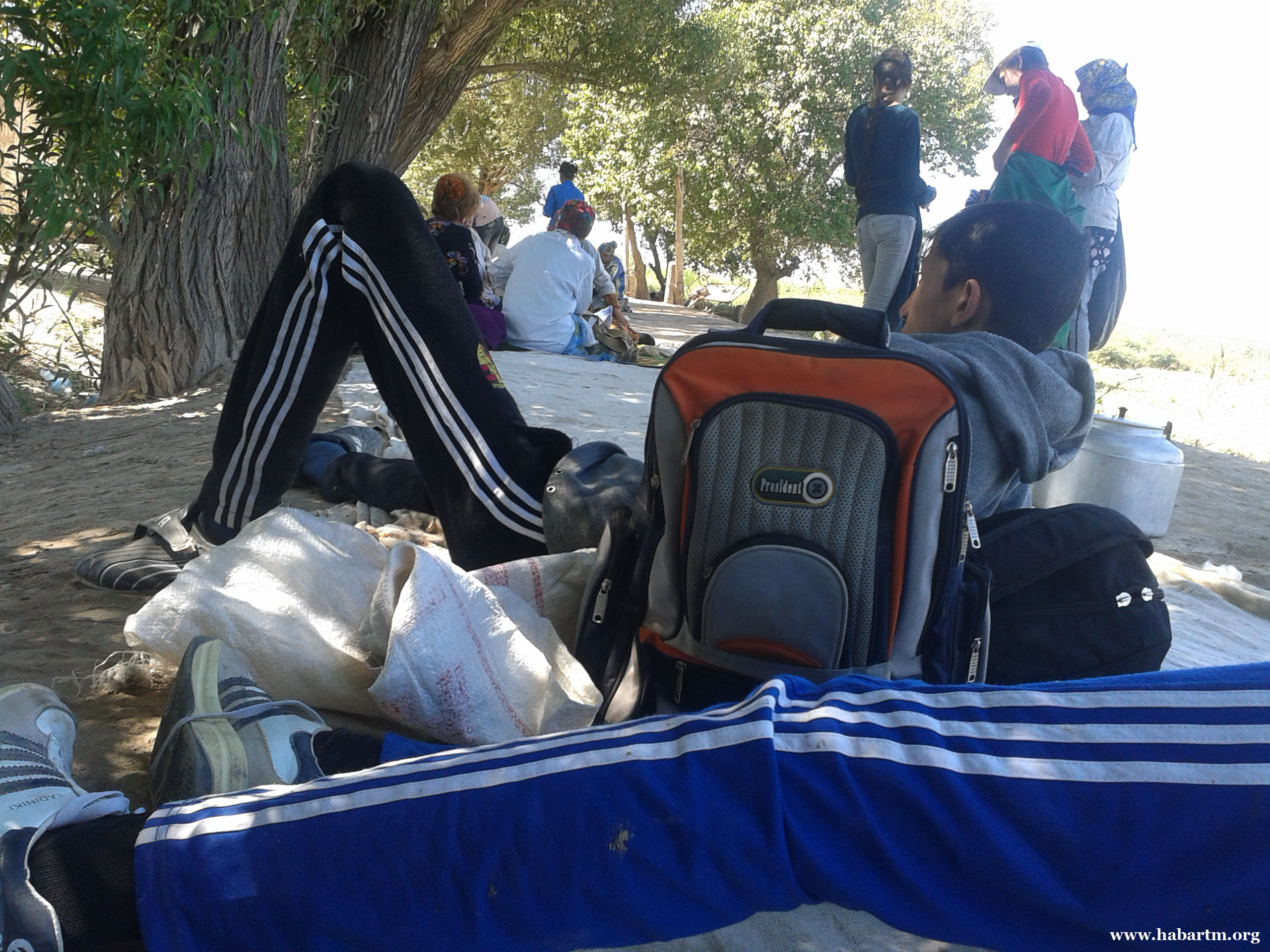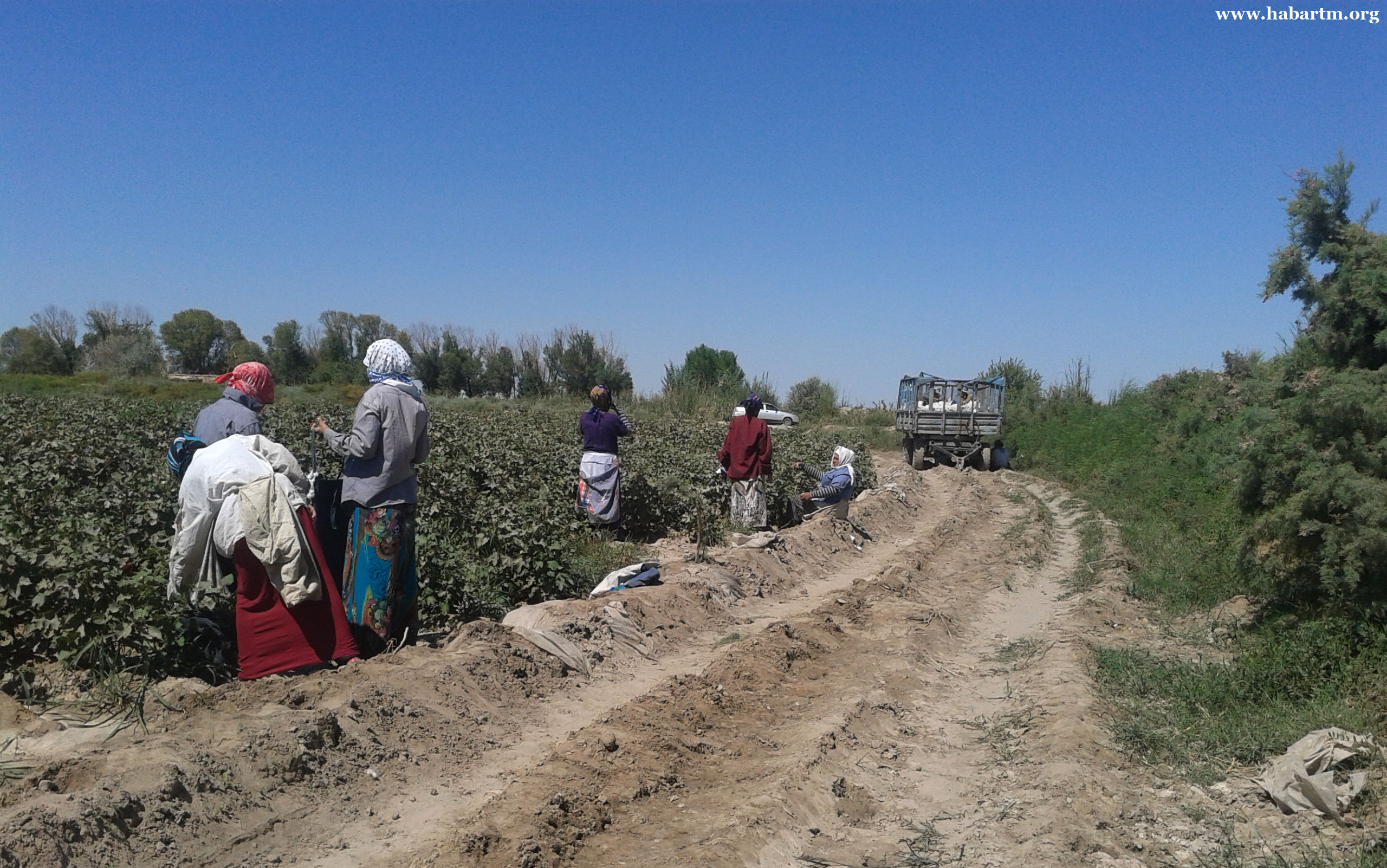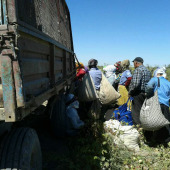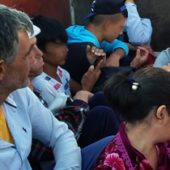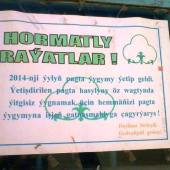Alternative Turkmenistan News (ATN) presents independent reporting on human rights in Turkmenistan, including state-led forced labor in the cotton sector. With this first report on the 2015 cotton harvest, ATN presents findings from the first weeks of the harvest.
The government of Turkmenistan has used a forced labor system of cotton production for decades. By using forced labor, the Turkmen government violates Article 8 of the national Labour Code, which bans forced or compulsory labor, and International Labour Organization (ILO) Conventions concerning forced labor, №29 and №105, both ratified by Turkmenistan. Despite its commitments under national and international law to protect Turkmen citizens’ right to freedom from forced labor, the Turkmen government is continuing to force thousands of public-sector workers to harvest the “white gold” in 2015.
Delays and Dependency on Manual Harvesting
The 2015 cotton harvest began late in Turkmenistan due to a flood and a disruption in harvesting plans.
The Amu Darya river flooded in mid-July, inundating cotton fields in several areas of Lebap province, one of the main cotton-growing regions. The flood destroyed planted cotton crops in many farms in the Koytendag and Hodzhambaz districts and the town of Atamurat.
“My plot completely flooded, and the plants were tall. We worked for nothing. We’ve done so much weeding and fertilizing, even hired help. I doubt our costs will be recovered, because we will not be able to fulfill the state target. I don’t know what to do now,” said a farmer in Garahowuz village, Koytendag district.
The President of Turkmenistan Gurbanguly Berdymuhamedov reprimanded provincial governors and members of the Cabinet of Ministers for a delay in the harvest and failure to defoliate the fields, at a meeting on September 18. Without defoliation, machine harvesters cannot be used.
According to official statistics, there are 500 cotton harvesters are available. This harvest, they are standing idle. In the few places where cotton fields have been sprayed with defoliants, it was done poorly, and the leaves are not falling off the bushes. Likely reasons include improper preparation of the defoliants and expired chemicals.
At the meeting, the President ordered the officials and head of the state-owned company Turkmenpagta, which is responsible for the cotton industry, to fix the problem within the week. Yet a week is not time to defoliate the fields, so the officials have resorted to intensive use of forced labor to mobilize cotton pickers.
Systematic Forced Labor in Each of the Cotton-Growing Regions
Provincial governors have forcibly mobilized public-sector workers, particularly employees of the education, health-care, and public utilities to the cotton fields in each of the cotton growing regions, Ahal, Dashoguz, Lebap and Mary.
The mobilization has proceeded similarly in each region. Regional governors oversee the district officials and administrators in their region. Administrators of public-sector institutions order employees to participate in the cotton harvest. Each morning at 6 AM is registration and departure to the cotton fields from the district administration offices. After officials record attendance, they direct everyone onto buses for transportation to the cotton fields. Each person takes food for the day- typically traditional Turkmen bread “chorek,” vegetables, herbs and hardboiled eggs, and the farmers provide drinking water and hot tea during a lunch break.
Many people ordered to work the harvest are hiring replacement workers instead of picking cotton themselves. For example, doctors and bank employees pay 10-12 manats daily ($3 — 3,50) to unemployed people to pick cotton in their place. Administrators of public-sector institutions also offer exemptions for a price.
“Hired labor is hard to find in the morning, and they are in great demand. So those who fail to find someone give their manats to their director or another official, so that they would find workers. At the end of the day, they add kilograms of cotton to the report and pocket the money. The managers divide it among themselves, while they tell us they count heads,” reported a school teacher in Mary province.
As a result, citizens are paying out-of-pocket the labor costs of the government’s cotton industry.
Farmers are required to pay for the buses, approximately 100 manats ($28) to private bus drivers and 200 – 300 manats ($57 — $86), depending on the number of seats, for buses that belong to state-owned enterprises (SOEs), for example, the gas supply company of Turkmenabat (on photo). The SOE buses charge more because the state agencies, though ordered by city officials to contribute transportation to the cotton harvest, need the buses for their operations. Therefore in situations when they are forced to send their buses to transport people to cotton fields, they charge more to cover the time when the SOEs’ operations are slowed and the buses are at the cotton fields.
Governor of Lebap Aims to Please the President with Aggressive Forced Mobilization
The Lebap region governor ordered “Everyone to the cotton fields!” including public-sector workers and pensioners, all adults except expectant mothers. Residents of Lebap attribute the governor’s zeal to his relative youth.
“Our province has a young governor, born in 1984. The cotton harvest is a good way for to distinguish yourself before the president, which is exactly what the governor is doing by helping with the harvest of the ‘white gold,’” wrote a Lebap resident to ATN.
The Lebap governor also closed the Medical Advisory Committee prior to the cotton harvest. The Committee is responsible for issuing exemptions to people from the strenuous field work due to medical conditions. This year, if Lebap residents want to keep their jobs, they have no choice but to pick cotton. Municipal administration officials record attendance of residents of their municipality as they board buses to go to the cotton fields.
Lebap’s governor is directly overseeing the harvest in the region. He has visited fields and each evening has been meeting until 10 PM with the administrators of institutions in the region.
Several administrators in Lebap reported that the municipal administration was closely monitoring each institution, recording statements and indications of whether they mobilized sufficient cotton pickers and took in sufficient cotton each day. One of the administrators, a school principal, said that the municipality would reprimand an administrator after three reports of falling short of mobilization and harvest goals, and fire an administrator after three more such reports.
The Forced Labor System’s Toll on Education and Health Care
The Turkmen government’s use of forced labor to harvest cotton is denying citizens access to essential services, including education and health care. Across the country, residents are reporting disruptions.
In each region, administrators have forced teachers to the cotton fields, leaving schools short on staff. In Dashoguz, Lebap and Mary regions, administrators force teachers to pick cotton two days each week and one Sunday each month. The administrators order teachers who remain in the school to teach courses for which they have no training and to teach groups of 60 or more students. Many students are simply not going to school. Instead of the scheduled 6 hours each day, many students are attending for 3-4 hours.
“During school hours our children are hanging around in the streets, playgrounds, markets. The school principal doesn’t even consider that children can get hurt, hit by a car, or involved in a crime. They should just make the harvest a holiday. What is the point of going to school if students are told in the morning that their teacher is in the field today?” said the mother of a 5th-grade student in Mary region.
A group of parents sent ATN the following message:
“Dear Teachers! Your place is in a school, not in a field. We trust you with our children. Give them lessons. Our children need knowledge!”
“Dear Deputy Minister of Education, free our teachers from picking cotton! Bring the teachers back to the schools!”
The administrators of hospitals and other health-care facilities are also forcing employees to pick cotton. In Lebap region, hospitals have the bare minimum number of staff to be open, and many of the employees left at the hospital are not authorized to receive patients. As a result, patients are waiting in long lines for attention.
Administrators of public utilities were among the first to send employees to this year’s cotton harvest. As a result, many cities have overflowing garbage containers lining the streets, and municipalities are not responding to calls for assistance. In one case, a pipe burst in an apartment building, but the municipality responded that “everyone is picking cotton.”
To be continued…
